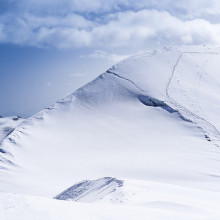How high can you go?
Ever climb a mountain and feel out of breath? What's going on there? Andrew Murray studies how the body deals with altitude...
In this episode

Naked Body: How high can you go?
Andrew Murray, University of Cambridge
Ever climb a mountain and feel out of breath? What's going on there? Andrew Murray studies how the body deals with altitude...
Andrew - On the summit ridge of Everest, high up in the Himalayas, a mountaineer takes their final few steps towards the rooftop of the world. At this altitude, nearly 9000 m up, the air is perilously thin and the climber has only about a third of the oxygen that was available to them back at sea level. This, then, is an extreme physiological challenge that calls on the lungs, heart and circulation to ensure that sufficient oxygen gets to the muscles, but also to the brain and other vital organs.
Now, we may not all wish to take on the challenge of Everest, but even at more modest altitudes we notice our bodies responding to the challenge. Within minutes of arriving at an altitude over 2000 m, perhaps on a ski trip, you might notice that your heart rate has quickened. At this altitude, the haemoglobin molecules carried within your red blood cells pick up less oxygen as they pass through your lungs, so an increased heart rate helps to maintain the amount of oxygen dispatched to the tissues of the body. Your breathing rate would increase too, which helps to refresh the air in the lungs, keeping the partial pressure of oxygen up which allows more of it to diffuse into the blood. This increased breathing rate is the body’s only means of elevating blood oxygen levels in the face of falling atmospheric pressures, and is a vital facet of the response to altitude. However, as your body attempts to maintain blood oxygen by breathing harder, it removes too much carbon dioxide. This makes the body fluids rather alkaline, and requires further adjustments. Over the first few days at altitude, your body tries to compensate by eliminating some bicarbonate in your urine, such that you can maintain a normal pH, but as a result you might notice yourself peeing a bit more than normal. The changes in your blood gas levels can also cause difficulties with breathing, especially when sleeping at night when breathing can become erratic.
Over time, further changes occur. Your kidneys sense the low oxygen levels in the blood and respond by producing a hormone, erythropoietin, which stimulates the production of red blood cells from the bone marrow. This increases the capacity of blood to carry oxygen and offsets the fall in haemoglobin oxygen saturation. Whilst acclimatisation can help to maintain blood oxygen, there are serious risks at altitude that can become life-threatening. At very high altitudes, disrupted blood flow to the lungs can lead to fluid retention, known as high-altitude pulmonary oedema, whilst a similar swelling of the brain, known as high-altitude cerebral oedema, can also occur. Climbers should be well-versed in the warning signs of these conditions – slurred speech, lack of coordination, and loss of consciousness in extreme cases. Whilst there are drugs that can help, the best medication for either condition? Descend, descend, descend!
Related Content
- Previous Hitman 3 and AI in Chess
- Next Knitting: a short history










Comments
Add a comment